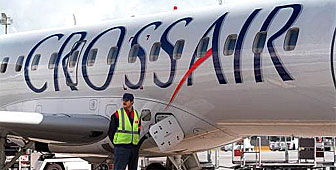Sunday vote to determine airline “Phoenix” plan

The canton of Zurich goes to the polls on Sunday in a key vote that will determine the future shape of the country's national airline.
Zurich’s voters are being asked to back a SFr300 million ($181 million) investment in a new company to replace the collapsed Swissair. The new airline, yet to be named, is being created around Swissair’s former regional subsidiary, Crossair.
Under the phoenix plan, Crossair is to expand its operations to take over 52 of Swissair’s aircraft, 26 short-haul and 26 long-haul routes.
The Basel-based airline has already raised around SFr2.4 billion from the government, banks and private business, with only the cantons left to decide whether to participate.
Zurich support
Zurich’s vote is crucial not only because it is providing the lion’s share of the cantons’ SFr400 million investment, but also because Crossair has made it clear that the phoenix plan will not go ahead without Zurich’s support.
Other cantons such as Lucerne, Glarus, Schaffhausen and Obwalden have also announced that they will only support the project if Zurich is on board.
So, a “no” vote on Sunday would kill the rescue plan in its current form and lead to the formation of a much smaller company. There would also likely be around a further 1,000 job cuts in the Zurich area on top of the thousands already axed.
“It would be rather uncooperative,” Crossair spokesman Andreas Schwander told swissinfo, “This whole rescue package basically benefits Zurich and the whole of Switzerland is paying to keep structures in the canton alive.”
“It would be very badly received by the rest of the country if Zurich wouldn’t take part,” he adds.
Pros and cons
Most of the main parties represented in Zurich’s cantonal parliament are recommending a “yes” vote on Sunday. They say a rejection would be a huge self-inflicted blow on a region that has already suffered greatly from the grounding of Swissair.
But the biggest party in Zurich, the right-wing People’s Party argues passionately against the investment, saying that it is throwing good money after bad.
“It’s taxpayers’ money we’re talking about and the taxpayer has already lost a lot of money through Swissair’s collapse,” People’s Party delegate, Alfred Heer told swissinfo.
“The new airline will not be viable and will never make a profit. In the first year, they are going to make a loss of over SFr1 billion. The risk is too high and it’s not for the taxpayer to invest in an airline that should be run privately.”
Crossair has been quite open in its estimate that first year losses could amount to SFr1.1 billion. But new boss, Pieter Bouw, says that a small profit may be possible by 2004.
Crossair’s Andreas Schwander has some sympathy with the argument that the private sector should be picking up the whole tab but says the airline industry is a special case.
“Airlines provide a certain public service in the same way as the post office or the railways,” he argues, “You cannot do without them, especially in a country that is landlocked, that is 80 per cent dependent on its export sector and that has a very strong tourist sector.
But many analysts such as the aviation expert, Sepp Moser, share the concerns expressed by the People’s Party.
“Certain failure”?
“The plan is only feasible in the short term because of all the money coming in,” Moser told swissinfo, “The new airline can afford to be a loss-making operation for the first year or so but in the long-run it’s a certain failure. The only question is when will Switzerland’s aviation ambitions fail – now or two to three years down the line.”
Moser says that with 26 long-haul aircraft, Switzerland will have per capita five times the long-haul capacity of Germany. That, he says, appears to be unsustainable.
He fears politicians and businesspeople have still not drawn the lessons of the Swissair debacle, which saw the carrier embark on a grandiose expansion programme that eventually brought it to its knees.
Many analysts say other proposals put forward at the beginning of the crisis stood a much better chance of success but the phoenix plan was adopted because it promised to safeguard most jobs.
“A sensible proposal that was rejected said that Crossair should go on much as before with about 80 short-haul aircraft and a very dense European network,” says Moser.
“Added to that would have been a very limited number of Swissair’s good profit-making long-haul routes. That would have added up to perhaps 80 original Crossair routes, ten or so additional Swissair European routes and 5 to ten long-haul aircraft.”
That proposal is about a third of the size of the project in which Zurich’s voters are being asked to invest.
Most political analysts think the chances of Zurich’s residents rejecting phoenix are slim. They believe that few have the stomach to vote to put more people out of work.
But although a “yes” vote will ensure the short-term viability of the phoenix plan, many analysts still believe it will struggle to survive.
By Michael Hollingdale

In compliance with the JTI standards
More: SWI swissinfo.ch certified by the Journalism Trust Initiative
You can find an overview of ongoing debates with our journalists here . Please join us!
If you want to start a conversation about a topic raised in this article or want to report factual errors, email us at english@swissinfo.ch.